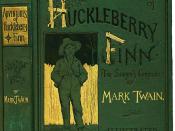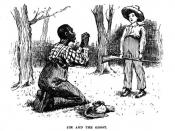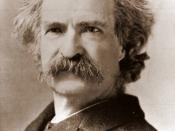All novels are the same; well, in a way they are. Most novels involve the mythological idea of the archetypal hero, where the protagonist follows an understood process. Included in this journey, is an event when the protagonist has a death and then is reborn. Although, in the novel, The Adventures of Huckleberry Finn by Mark Twain, this idea of death and rebirth is found rather effortlessly, there are other events which contain the same idea, but require more "higher level thinking," according to Bloom's theory. Huck Finn has many moments where he "dies," but one is obvious.
Huckleberry Finn "dies" when he stages his own death to escape from his father. This staged death by Huck leads him to begin an adventure. Many people who have read this novel read this passage and think Huck is faking his own death to escape his father, and that alone. Although this fact is true, Huck also fakes his own death so he can have a new identity and a new life.
This was a good place for Twain to include the death portion of the death and rebirth cycle. Huck states in chapter seven, "I says to myself, I can fix it now so nobody won't think of following me." This passage describes how Huck wants to erase his identity and run away. By killing himself, Huck creates a new, unknown life.
Huck's new life begins when he stets foot into his canoe. This is a moment of both fear and joy because Huck knows he is beginning a new life. He knows he will not be able to talk to anybody or be seen. This situation is similar to Odysseus', when he has returned home in a disguise. Odysseus cannot talk to anybody he knows because he will reveal his...


